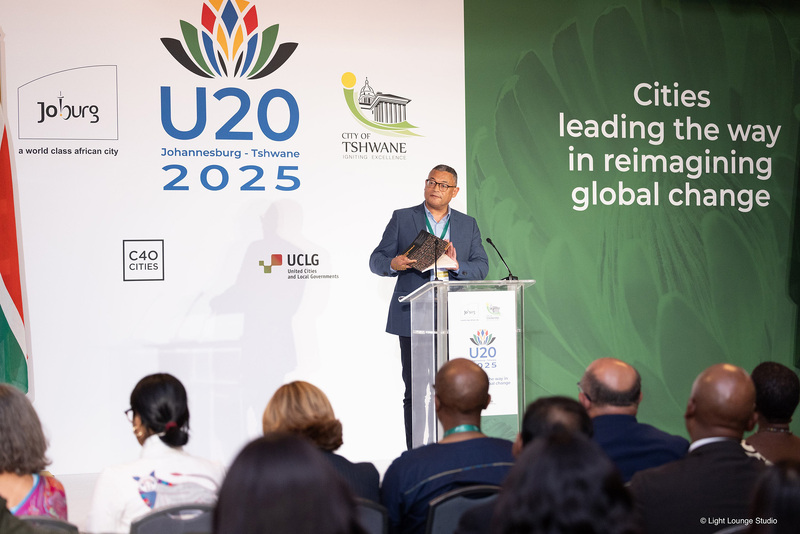A rallying call for Africa’s urban future
10 November 2025 | Story African Centre for Cities. Voice Cwenga Koyana. Read time 6 min.
Urban2063, a coalition of 13 leading African and global institutions led by the African Centre for Cities (ACC) at the University of Cape Town, has launched An Unstoppable Force – a powerful new Cityscapes Magazine special report that challenges Africa to rethink the future of its cities radically. Anchored in the African Union’s Agenda 2063, the report delivers an unflinching assessment of the continent’s urban trajectory, while offering a bold roadmap to harness urbanisation as a catalyst for inclusive growth, resilience, and justice.”
By 2063, an additional one billion Africans will be living in cities. Yet today, over 80% of urban jobs remain informal, millions of young people grow up in slums, and basic services such as housing, healthcare, and education remain out of reach. These structural failures are compounded by climate change, with 70% of African cities already classified as extremely vulnerable. In the face of this escalating crisis, the report is both a warning and an invitation: a call to recognise that Africa’s urban future is not yet written and can still be transformed.

The report emphasises that Africa has all the ingredients it needs to chart a new path. With its resources, talent, demographic advantage, and the ingenuity of its youth, the continent can turn its cities into engines of inclusive growth and opportunity. What remains missing is leadership willing to embrace reform and act with urgency.
“By 2063, a billion more Africans will live in cities. This report is a wake-up call and a roadmap for how we can harness this transformation for dignity and justice,” said Professor Edgar Pieterse, the founding director of the ACC.
A call to action for Africa’s future
Through interviews with mayors, government officials, business leaders, and activists, alongside provocations and think-pieces from scholars and organisers, the report outlines bold solutions to overcome structural challenges. It also incorporates fresh data, reporting, and diverse perspectives from across the continent.
“Africa has the resources, talent, and energy it needs. What’s missing is leadership willing to act. The Unstoppable Force is both a warning and an invitation to reimagine our cities’ futures,” added Tau Tavengwa, founder and co-editor of Cityscapes Magazine.
Contributors include former South African finance minister Trevor Manuel, former Mozambican prime minister Luisa Dias Diogo, Zimbabwean activist Namatai Kwekweza, Kenyan community organiser Regina Opondo, Will Senyo of Accra Impact Hub, and the mayors of Shaggar City, Lusaka, and several other African cities. Together, they share the conviction that Africa’s future lies in unlocking the transformative potential of its cities.
Anchored in Agenda 2063
The Urban2063 Coalition places sustainable urbanisation at the heart of Africa’s structural transformation in line with the African Union’s Agenda 2063. In 2025, its work is focused on shaping global deliberations through the G20 and the Urban 20, ensuring that Africa’s voice is central to global conversations on urbanisation and resilience. The launch coincided with the Urban20 Mayoral Summit, held in Johannesburg in September, as part of South Africa’s G20 presidency. The three-day gathering of mayors from around the world culminated in the U20 communique – “an action-driven declaration of city recommendations, formally submitted to the G20 to ensure urban voices shape global policy”.
The coalition brings together leading institutions, including the ACC, African Climate and Development Institute, Association of African Planning Schools, ARUP – Africa Region, Cambridge Institute for Sustainability Leadership (Africa chapter), Centre for Sustainability Transitions (University of Stellenbosch), Climate KIC, Club of Rome (Africa Section), Urban Futures Lab, Utrecht University, Women in Employment Globalizing and Organizing (WIEGO), World Resource Institute (WRI), Overseas Development Institute (ODI), GSMA, and CS Studio.
A turning point for Africa’s cities
As protests in Nairobi, Maputo, and Dakar demonstrate, Africa’s youth are demanding more accountability, better services, and opportunities to build their futures. The report underscores that resilience, innovation, and tech fluency are not enough without structural reforms to housing, energy, education, and healthcare.
With climate change threatening to make fragile urban systems even more volatile, the urgency to act is greater than ever. An Unstoppable Force urges policy makers, investors, development practitioners, and citizens alike to recognise this critical moment and commit to transformative action.
The report serves as both a provocation and a reference point for policymakers, urban leaders, and practitioners seeking to engage with the challenges and opportunities of Africa’s urban future.
 This work is licensed under a Creative Commons Attribution-NoDerivatives 4.0 International License.
This work is licensed under a Creative Commons Attribution-NoDerivatives 4.0 International License.
Please view the republishing articles page for more information.










